| Srl | Item |
| 1 |
ID:
134356
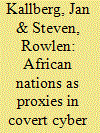

|
|
|
|
|
| Summary/Abstract |
The growth of the African Internet, and services related to the Internet, has been rapid over the last decade. Following this market expansion, a variety of service providers have started to provide access. A fast-growing market puts pressure on the providers to deliver services first and only then seek to secure the networks. Over time, industrialised nations have become more able to detect and trace cyber attacks against their networks. These tracking features are constantly developing and the precision in determining the origin of an attack is increasing. A state-sponsored cyber attacker, such as intelligence agencies and electronic warfare units, will seek to avoid detection, especially when the attacks are politically sensitive intelligence-gathering and intrusion forays into foreign states' networks. One way for the attacker to create a path that links the attacks and the originating country is by actions through a proxy. The less technologically mature developing nations offer an opportunity for cyber aggression due to their lower level of security under the quick expansion of the Internet-based market. Developing countries could be used as proxies, without their knowledge and consent, through the unauthorised usage of these countries' information systems in an attempt to attack a third country by a state-sponsored offensive cyber operation. If the purpose of the cyber attack is to destabilise a targeted society and the attack succeeds, the used proxies are likely to face consequences in their relations with foreign countries, even if the proxy was unaware of the covert activity.
|
|
|
|
|
|
|
|
|
|
|
|
|
|
|
|
| 2 |
ID:
132635
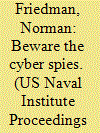

|
|
|
|
|
| Publication |
2014.
|
| Summary/Abstract |
In May, the U.S. government circulated a wanted poster showing five members of a shadowy Chinese cyber-espionage unit. No one expects any of them to turn up in a U.S. courtroom, but the object of the publicity was twofold. First, it was intended to show the Chinese that the U.S. government takes their operations seriously, that it can and will retaliate in some unspecified way. It is as pointless to ask the Chinese (and many others) to abandon cyber espionage as it would be to seek an international treaty barring any other kind of spying. The spies would stay in business, but some naive governments would abandon counterespionage, and cease any spying of their own.
|
|
|
|
|
|
|
|
|
|
|
|
|
|
|
|
| 3 |
ID:
113386
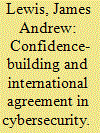

|
|
|
| 4 |
ID:
132419
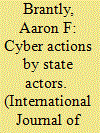

|
|
|
|
|
| Publication |
2014.
|
| Summary/Abstract |
Covert action is as old as political man. The subversive manipulation of others is nothing new. It has been written about since Sun Tzu and Kautilya. People and nations have always sought the use of shadowy means to influence situations and events. Covert action is and has been a staple of the state system. A dark and nefarious tool often banished to philosophical and intellectual exile, covert action is in truth an oft-used method of achieving utility that is frequently overlooked by academics. Modern scholars contend that, for utility to be achieved, activities such as war and diplomacy must be conducted transparently. Examined here is the construction of utility for a subset of covert action: cyber attacks.
|
|
|
|
|
|
|
|
|
|
|
|
|
|
|
|
| 5 |
ID:
119768
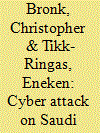

|
|
|
| 6 |
ID:
142347
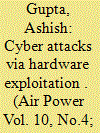

|
|
|
| 7 |
ID:
154860
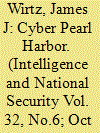

|
|
|
|
|
| Summary/Abstract |
The article describes the incentives that would motivate an opponent to incorporate a surprise cyber attack into a conventional operation to defeat US deterrent strategies by presenting the United States with a fait accompli. In describing this ‘Cyber Pearl Harbor’, the article explores the organizational and intelligence constraints that make it difficult to respond to the prospect of a combined cyber surprise attack and conventional operation. The article suggests that a cyber surprise attack will not occur in a political or strategic vacuum. Instead, weak opponents will use it to achieve objectives that could not be attained if US and allied forces were fully alerted.
|
|
|
|
|
|
|
|
|
|
|
|
|
|
|
|
| 8 |
ID:
131942
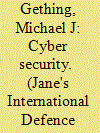

|
|
|
| 9 |
ID:
118467
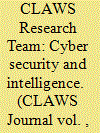

|
|
|
| 10 |
ID:
105609
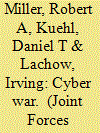

|
|
|
| 11 |
ID:
109257
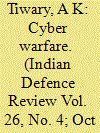

|
|
|
| 12 |
ID:
143834
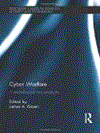

|
|
|
|
|
| Publication |
Oxon, Routledge, 2015.
|
| Description |
xiv, 182p.: ill., figures, tableshbk
|
| Series |
Routledge Studies in Conflict, Security and Technology
|
| Standard Number |
9781138793071
|
|
|
|
|
|
|
|
|
|
|
|
Copies: C:1/I:0,R:0,Q:0
Circulation
| Accession# | Call# | Current Location | Status | Policy | Location |
| 058477 | 355.4/GRE 058477 | Main | On Shelf | General | |
|
|
|
|
| 13 |
ID:
128325
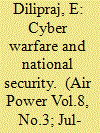

|
|
|
|
|
| Publication |
2013.
|
| Summary/Abstract |
In the wake of the 21st century, the cyber world to spread its roots deep in to the society and penetrated the lives of the people so much so that the internet became an indispensable part of the citizens' life, thus upgrading them to the status of netizens. Moreover technology in cyber space gained dynamism, increasing the population of netizens. This became possible in the cyber space not because all the citizens became technically sound but also because the cyber technology became more user friendly. Nevertheless, the highs of the liberty of express was readily available in the cyber space by virtue of the very low level of restrictions and legal barriers applies by the government of the countries in the cyber space.
|
|
|
|
|
|
|
|
|
|
|
|
|
|
|
|
| 14 |
ID:
106054
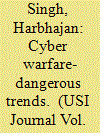

|
|
|
| 15 |
ID:
141532
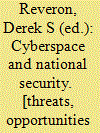

|
|
|
|
|
| Publication |
New Delhi, Satyam Law International, 2013.
|
| Description |
ix, 246p.: ill.pbk
|
| Standard Number |
9789382823001
|
|
|
|
|
|
|
|
|
|
|
|
Copies: C:1/I:0,R:0,Q:0
Circulation
| Accession# | Call# | Current Location | Status | Policy | Location |
| 058334 | 355.033002854678/REV 058334 | Main | On Shelf | General | |
|
|
|
|
| 16 |
ID:
108288
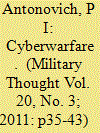

|
|
|
| 17 |
ID:
109276
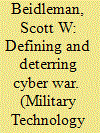

|
|
|
| 18 |
ID:
108866
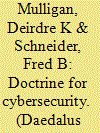

|
|
|
| 19 |
ID:
150089


|
|
|
|
|
| Summary/Abstract |
The use of coercive instruments of statecraft and military power to affect changes in strategic behavior is a common feature of international politics. Recently, a variety of state and sub-state actors have attempted to utilize cyber instruments of disruption and intrusion to bring about favorable outcomes. This article notes that digital instruments for coercion offer limited potential for effective compellent effect in world affairs. Nevertheless, as the case of North Korea's 2015 hack and (attempted) manipulation of Sony demonstrates, coercion using cyber weapons of intrusion and disruption is possible under particular conditions. In describing these conditions, I argue that the limits of cyber coercion should be seen more as a function of relevant social and institutional context than of the current state of technological possibilities. Technology certainly determines parameters of coercive interaction between actors, but success—and thus most determinants of strategic decisions surrounding cyber coercion—derives directly from sociopolitical context.
|
|
|
|
|
|
|
|
|
|
|
|
|
|
|
|
| 20 |
ID:
086831
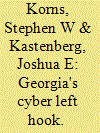

|
|
|
|
|
| Publication |
2009.
|
| Summary/Abstract |
On 19 July 2008 an Internet security reported a distributed denial of service (DDOS) cyber attack against web sites in the country of Georgia. Three week later, on 8 August, security experts observed a second, more substantial round of DDOS attcks against Georgian web sites.
|
|
|
|
|
|
|
|
|
|
|
|
|
|
|
|